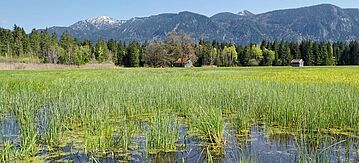Celebrating 25 years of the EU Habitats Directive and nature conservation across European borders
Today marks the 25th anniversary of one of the central pillars of European nature conservation policy: The EU Habitats Directive was adopted on 21 May 1992. The Directive establishes the basis for the European Natura 2000 network of protected areas and provides large-scale protection for endangered plants, animals and habitats. Covering more than 18 per cent of the EU’s land surface, Natura 2000 is the world’s largest network of protected areas. The recent Fitness Check by the European Commission dispelled doubts voiced by members of the Commission regarding the fitness and effectiveness of the nature conservation directives.
According to Federal Environment Minister Barbara Hendricks, the adoption of the Habitats Directive was a true milestone for nature conservation in Europe: "The directive is of vital importance for Europe’s nature. Positive developments such as the return and spread of the wild cat and the otter in many parts of Germany show the directive’s effectiveness. We must focus now on practical implementation."
In Germany, more than 4500 sites are protected under the Habitats Directive as part of the Natura 2000 network. In addition, over 230 species most in need of conservation are protected nation-wide. Thanks to joint conservation strategies and actions, populations of several endangered species have spread again and reached stable levels. Nonetheless, many habitats and species still have an unfavourable conservation status.
As a follow-up to the Fitness Check, the European Commission released the Action Plan "for nature, people and the economy" in April. Among other things, the plan aims to improve knowledge dissemination, exchange and cooperation between land users and conservationists at regional and European levels and funding of Natura 2000. The German government is of the opinion that joint efforts for the implementation of the Habitats Directive need to be stepped up in order to achieve the European Union’s biodiversity goals by 2020.

